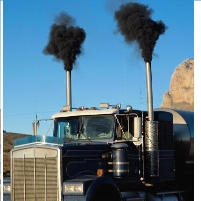Bipartisan Support for Combating Soot
Saturday, May 09, 2009

This past Earth Day, April 22, senators from both ends of the political spectrum, including John Kerry (D- Massachusetts) and James M. Inhofe (R-Oklahoma), came together to support and present a bipartisan bill that would order the Environmental Protection Agency (EPA) to regulate and study the second largest contributor to global warming: black carbon, otherwise known as soot. Such bipartisanship regarding environmental issues was common during the 1970s, but has rarely been seen since then.
Black carbon is a dangerous and dirty pollutant emitted by old diesel engines in the United States, and is a by-product of dung- and wood-fueled stoves in the Third World. The black particles have serious consequences for glacial melting, with one study estimating that they have caused half of the Arctic warming. Black carbon also has respiratory health repercussions for women and children who use primitive cookstoves.
The EPA is performing a four-phase study that “1) develops a universal definition of black carbon; 2) identifies global black carbon sources and reduction technologies; 3) identifies current and possible international funding opportunities to mitigate black carbon emissions; and 4) identifies opportunities for future research and development.” One goal is to reduce black carbon output by finding substitutes for cookstoves that pollute.
-Jenny Kim
Senate Foes Agree on Dangerous Pollutant (by Andrew C. Revkin, New York Times)
Black Carbon Linked to Half of Arctic Warming (by Jeremy Hance, MongaBay)
Third-World Stove Soot Is Target in Climate Fight (by Elisabeth Rosenthal, New York Times)
- Top Stories
- Unusual News
- Where is the Money Going?
- Controversies
- U.S. and the World
- Appointments and Resignations
- Latest News
- Musk and Trump Fire Members of Congress
- Trump Calls for Violent Street Demonstrations Against Himself
- Trump Changes Name of Republican Party
- The 2024 Election By the Numbers
- Bashar al-Assad—The Fall of a Rabid AntiSemite






Comments